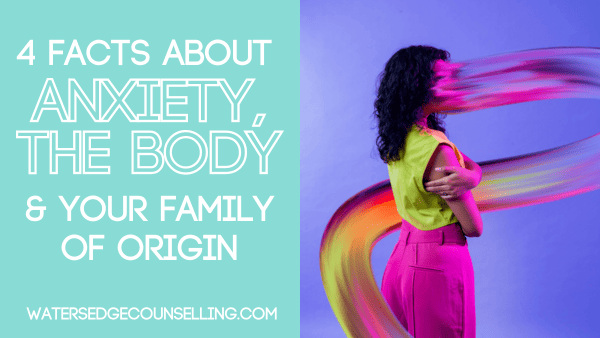
“Stop being such a scaredy cat!”
“Stop being so anxious”
“Get over it, it’s not a big deal!”
“Why are you so afraid of everything?”
Do any of those phrases resonate with you? For anyone who experiences high anxiety, these sayings can be common. Others see our bodily reactions as over reactions. But in the moment, our twisted stomach, sweaty palms, and brain fog doesn’t feel like an over-reaction. It feels like the only way to survive a fight-flight-freeze scenario, and we are doing our best to survive.
The fact is, many of us experience anxiety in our body, and often it’s connected to our family of origin. Meaning that our physical and emotional response to something is about more than what other people observe, it’s connected to generational beliefs and experiences that have shaped us.
In a new infographic, Lindsay Braham captures this perfectly. She listened to an episode of the We Find Our Selves Podcast by Adam Young on anxiety, the body and family of origin, and was so inspired that she created a visual version of what she learned. And the details are fascinating. We’ve included some parts of Lindsay’s infographic below, but you can download a high-resolution version of the whole page now on her website here.

-
Anxiety is rooted in body sensation, while fear is a visceral response to a situation.
So calling someone a ‘scaredy cat’ or saying just ‘get over it’ is unhelpful to those is a heightened state. Their body is poised for survival. This is not just something they can remove themselves from (like a fire in a building). This is an experience they need to process and wind down from.
-
Emotions supressed in childhood appear as anxiety in adults.
Children (and adults!) need to process their emotions and feelings. So those who have be conditioned to avoid negative feelings, or who have been morally kept from processing things due to religious beliefs, will experience anxiety in the body as adults.

-
Adults who were punished for being ‘emotional’ as kids will experience anxiety as an adult.
Our emotions don’t disappear because we shove them down. We need to give ourselves permission to feel them. For some people, befriending their ‘inner child’ is a great step towards healing.
-
Our emotions are expressed in the body in unique ways.
Your short breaths or tensed muscles are connected to pain and unfelt emotions from the past. Different emotions will be felt in different parts of the body, and this depends on who you are. For instance, some people feel intense fear in their gut. While others feel like they have a frog in their throat when they are feeling anger.
You can see Lindsay’s original post and download her artwork here. Listen to Ep #109 of The Place We Find Ourselves, a podcast created by Adam Young here.
Do you experience anxiety? Did you have to supress certain emotions or feelings as a child? Contact Colleen on 0434 337 245, Duncan on 0434 331 243 or Rachel on 0442177193 for a FREE 10-minute phone consultation on how we can best help you, or press book now and make an appointment.